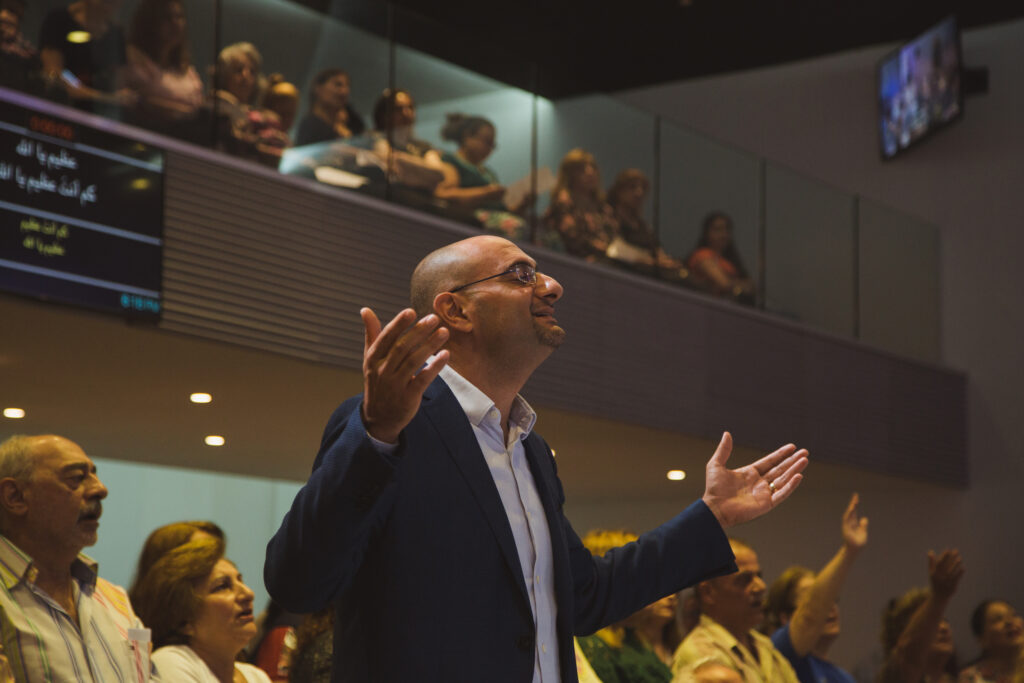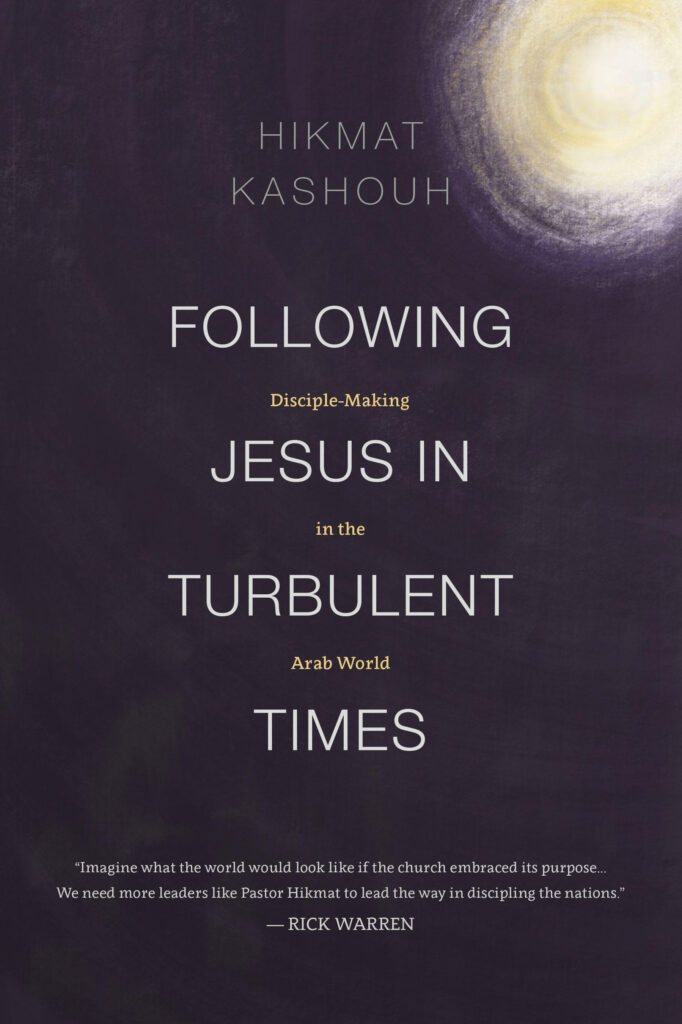The cost of following Jesus: Navigating persecution

By Dr. Hikmat Kashouh
An excerpt from “Following Jesus in Turbulent Times: Disciple-Making in the Arab World” (Langham Global Library, 2018).
It has been said that “a cross-centered gospel requires cross-carrying messengers.” That is certainly what Christ meant when he said, “If anyone would come after me, let him deny himself and take up his cross daily and follow me” (Luke 9:23). This does not sound optional to me. Paul followed in Jesus’s footsteps, and could write “I have been crucified with Christ. It is no longer I who live, but Christ who lives in me” (Gal 2:20).
Following Christ is costly. Jesus warned that some would kill us while thinking that they were offering service to God (John 16:33). Persecution is the norm for followers of Christ. The ties between discipleship and persecution are so strong in the Scriptures that it seems unavoidable. This new way of life to which we call people includes a daily invitation to join Christ in carrying the cross. Those who examine the book of Revelation understand that God conquered the world not by sending a lion (as the Jews expected) but by sending a lamb to be slaughtered for the sins of the world.
Experiencing persecution
When we celebrate incarnational living, we should also remember that we need to celebrate incarnational dying as well. Look again at Paul’s great hymn to Christ:
Have this mind among yourselves, which is yours in Christ Jesus, who, though he was in the form of God, did not count equality with God a thing to be grasped, but emptied himself, by taking the form of a servant, being born in the likeness of men. And being found in human form, he humbled himself by becoming obedient to the point of death, even death on a cross (Phil 2:5–8).
Like him, we are called to follow a path of suffering, humiliation and love. This truth is well known in the Middle East where persecution can come from all directions: from the government, from militant groups, from the extended family and from a brother or spouse. I recently sat separately with one couple and two individuals who have been following Jesus for more than two years, and they shared with me about their everyday lives. The issue for them was not whether they would suffer persecution but how they were to manage their lives in the midst of it. Persecution is very real and, sadly, their experience is not uncommon among our brothers and sisters.
What form does persecution take in our context?
Below are a few examples of what members of our congregation have experienced:
- Attempts to kill someone who is regarded as apostate.
- Phone calls from a brother or a close relative threatening to kill a woman because she is shaming the family. (Fortunately, few carry out that threat, but the threat is real.)
- Phone calls from close relatives disowning a believing woman. Her WhatsApp messages may be blocked, and when she calls her family, no one picks up the phone.
- Marginalization and exclusion from weddings and funerals.
- Taking away a woman’s children.
- Being forced to sit with her husband and read the Qur’an.
- Being forced to wear a hijab.
- Physical and sexual abuse.
- Detention at home, with the wife and child being forbidden to leave the house or go to church.
- Abandonment, with the husband marrying another woman without divorcing his believing wife in order to increase her affliction.
- Job loss because of their faith.
- Exclusion from job opportunities or unfair pay.
- Financial persecution, including the loss of an inheritance or a monthly allowance.
- Prohibiting believers from meeting regularly with other believers.
Those are the cases I have come across in my own church. I have also heard from the head of an NGO about a Muslim Syrian woman who became an outcast and was kicked out of her house and her village because she married a Christian. (The leader of the NGO found her and took her in.) There is also the horrific story of Sara Fatima Al-Mutairi’s murder by her brother because she became a Christian. She was only twenty-six years of age when her brother burnt her face, tortured her and killed her because she followed Jesus. In her letter to Magy al-Khoury she wrote:
I was searching about the truthfulness of the Gospels and of Jesus because I was greatly attracted to Jesus. From the very beginning when I started reading about him I saw the difference between what I believed about Mohammad and what I was discovering about Jesus in the Gospels . . . What really attracts me in the Gospels is the story of Jesus. In my view, this is the greatest story in human history. It is the best example of love, redemption and humility.
Fatima had to pay a high price for choosing to follow Jesus; others will, too, until God fully establishes his kingdom on earth. The West sees following Jesus as a form of entertainment. Yes, there is plenty of joy and peace in Christ, but, in our region and during the first few centuries of Christianity, it was always coupled with persecution and suffering.
Leading in a context of persecution
Leaders who serve among people of non-Christian backgrounds should not take lightly the cost of serving Christ, especially if they are married and have children. Serving in the Arab world is life-threatening. I do not mean to say that it is life-threatening all the time, but the reality is that it can happen anytime. In Lebanon, we do have a great measure of freedom to share Christ with anyone. This, however, does not prevent persecution from flaring up. We feel safe today, but who knows what tomorrow will bring. As for tomorrow, Jesus said: “So do not worry about tomorrow; for tomorrow will care for itself. Each day has enough trouble of its own” (Matt 6:34 NASB).
Below are a few words of advice to help leaders avoid unnecessary persecution:
- Love the people you meet daily. We have found on a number of occasions that those who protect us from persecution are the very people who once did not like us. It is not your fellow believer who persuades your persecutor to stop attacking you; it is his friend who has seen your love and can speak to your persecutor and be granted a hearing. The importance of making friends and building good relationships cannot be stressed enough for anyone who wants to serve in the Arab world.
- Visiting leaders or missionaries should always work with the local church and shadow local leaders to minimize their own persecution. The locals will understand cultural sensibilities and will be able to identify places of danger that need to be avoided.
- Proclaiming Christ boldly yet gently is always rewarding, even if the results are slow in coming. Polemical approaches that attack other faiths create animosity. Although they may seem to bear some fruit, especially among fundamentalist Muslims, they also create disruption and unnecessary social upheaval. Muslims in Lebanon and, I would argue, elsewhere are not overly concerned if an individual simply chooses to follow Christ. It is when that individual becomes a threat to the established group (a family, clan or community) that persecution becomes more intense.
- Communicate your intention and agenda clearly. Almost every Sunday, I stand up in front of my church and remind my congregation about the purpose of what we do every week. I tell them we have no political agenda and are not a militant group. We are a church and our purpose is not to become religious but to follow Jesus more closely. We exist to make disciples. We have found a new way to live our life, a new way to become human, a new path to follow, and this path is to be conformed to the likeness of Jesus. If you want to become like Jesus, you have come to the right place.
- Differentiate between socio-cultural values and core Christian values. People in our community can still look the same, cook the same food, wear the same clothes and retain a lot of their cultural norms and values (such as honoring their parents and submitting to one another) without compromising and losing their new identity in Christ. People do not have to look and act like Westerners to be Christians. We all know that, yet we still expect new followers of Jesus to think in a Western way, to use Christian terms imported from the West or to dress in a certain way. We naturally want people who share our faith to behave like us, look like us and sound like us. We should never force them to do this, but we should not stop them from becoming like us if they choose to do so. This should always be a matter of choice. It is natural that we influence one another. By reading from the same book and singing the same songs and hearing the same sermons, we start using similar terminology and become closer culturally and socially. This is unavoidable. Preachers, teachers and life group leaders should remain as close as possible to the Word of God in core matters and as close as possible to their social context in peripheral matters in order to lead healthy groups and avoid unnecessary persecution.
- Demonstrate care for the whole family. Isolating one individual and sharing Christ with them is not a bad strategy, especially if you are working in a hostile environment. However, we have found that when a leader ministers to and serves the whole family, including the children, a new dynamic emerges. This person becomes the friend of the family and the children ask for him or her. Parents love it when a leader bows down and gives special consideration to their child. They find the leader humble and caring. It is good to bless children in front of their parents, to buy small gifts for them, and to show them physical affection by carrying them and kissing them on the forehead or on the cheek. It creates a new kind of bond between the family and the follower of Jesus.
- Avoid talking politics. I think this is impossible in the Arab world, but at least we can try! I personally find it hard, and I seldom manage to stay away from politics. I feel people like to know my opinion, and above all they like to tell me what they think and believe regarding politics. I have learned to speak about politics but remain positive and avoid speaking ill of a governor, to neither judge others nor start complaining and assigning blame as well as never to confuse facts with opinion. This positive approach can help you see politics as an entry point to building good relationships, but it can also get you into trouble.
- Expect that some people will deceive you. When you love, you choose to become vulnerable, and this may cause you pain. I once heard a pastor say that if you see a wolf coming towards you, you get ready to protect and defend yourself, but if one of your sheep comes towards you, you open your arms to receive him. If the sheep then attacks you, how much more you are hurt! When you choose to treat your enemies as friends, you may end up paying a high price.
God’s vindication
When I quoted Paul’s hymn at the start of this chapter, I deliberately omitted the last verse. But now we need to hear it:
For this reason also, God highly exalted him and bestowed on him the name which is above every name, so that at the name of Jesus every knee will bow, of those who are in heaven and on earth and under the earth, and that every tongue will confess that Jesus Christ is Lord, to the glory of God the Father (Phil 2:9–11).
Jesus did not stay in the grave. Jesus rose in victory. The path of following Jesus does not end at the tomb but rather leads through the tomb towards victory. This glorious message should be a daily reality that will be fully realized upon his return.
It is wrong to think that God’s vindication is solely something that will happen in the future. It has already happened on the cross and through the resurrection and ascension of Christ, and it has practical implications in our daily life. The stories of transformation and restoration in this book and in the life of every believer demonstrate the present reality and implications of God’s work through Christ in us. The forgiveness of sins, peace in the midst of tribulation, boldness to witness in the midst of persecution, courage not to renounce one’s faith in the face of death, acts of kindness and humility in relationships, victory over lustful and selfish ambitions, a forgiving spirit, love for all, including our enemies, miraculous healings of our bodies and souls, freedom from the evil past, self-control, the recovery of our identity, belonging to a family of God that is multi-racial and multi-ethnic, thriving in the Arab world which is predominately Muslim, and having the assurance that eternity is secured by the blood of Christ – these are all marks of vindication in our daily life.
Read more: A Biblical perspective on suffering and salvation
Walking victoriously has a tremendous impact in our region, especially for those who are still rooted in the tribal way of thinking where vindication is the mark of true heroism. No one wants to follow a weak leader who died on the cross and did not rise from the dead. No one wants to follow a defeated person from another tribe. Our victorious life is the key that draws people to Christ.
Today we can live as “more than conquerors.” We can live with great hope that the world will not be the same. This is not triumphalism; this is the victory of Christ in us. So, we walk with confidence, but not with arrogance. We look our enemy in the eye, but we do so with compassion and love. We walk fearless of death because our eternity is secure and because we are confident that God has the final say in all matters. We walk victoriously because we do not seek anything for ourselves, for we know that we are his children, princesses and princes of the King, the King who was born in a humble manger yet is the King of kings, who wept for Lazarus, who bent down and washed the feet of his disciples, who wore a crown of thorns, was abandoned, mocked, tortured, humiliated, shamed and was killed by the most shameful and disgraceful punishing method of crucifixion, yet remained the Son of God to whom all power and authority was given and whose name is above all other names.
A victorious life is not about what we do; it is about who we are. It is about preserving and cherishing our first love. The deeper our relationship with Christ, the better our understanding of true victory will be. A victorious life is a humble, Christ-honoring, outward-looking, serving life. It is the freedom to choose to walk behind our Master as closely as possible, without the burden of sin, law, fear or death. It is a choice to love him unceasingly, to obey him faithfully, and to serve him at any cost.

Dr. Hikmat Kashouh is the senior pastor of Resurrection Church Beirut, a vibrant and growing missional church located in the suburbs of Beirut, Lebanon. Over the last decade, Reverend Kashouh has led Resurrection Church through the blessings and challenges of their numerical growth, focusing on disciple-making and serving those in need. Hikmat is involved in the Global Kingdom Partnership Network and also has a PhD in Textual Criticism from the University of Birmingham, UK. Prior to his current role, he was the academic dean at Arab Baptist Theological Seminary, where he still is a research professor. Pastor Hikmat speaks at various conferences in the Arab world and the West. He and his wife Krista have three children, Markus, Betine and Daniella.

